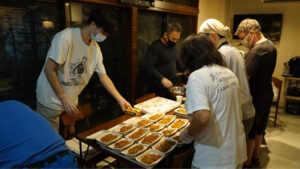Marcuss Fellow Rio Smith ’25 Researches State Statistics and Homelessness in Tokyo
On April 10, 2025, Rio Smith presented his project “Understanding Urban Margins: How Statistics and Urban Policy Police Tokyo’s Homeless Geographies” as a 2025 Marcuss Fellow. Smith’s project looked at how Tokyo’s state statistics represent the homeless population in the city. He also examined the state’s motivations for how they choose to represent the homeless. Marcuss Fellows conduct research on issues faced by urban communities with the goal of producing a senior honors theses or capstone independent research project that is submitted for publication. This year’s other Marcuss Fellow, Isabella Paris, conducted research on immigrant community development in New York and Barcelona.
Past summer research with the Center for Urban and Global Studies through a Tanaka summer research grant inspired Smith’s research for the Marcuss Fellows program. Smith’s past research looked at the day laborer market in the Sanya District in Tokyo, sparking his interest in a continued examination of Tokyo’s vulnerable populations.

Smith explains that though the subject of his current work is the homeless population in Tokyo, the academic focus of the thesis is how statistics represent these populations. In his project, Smith is not trying to determine if one way of representing homeless populations is better than another but rather trying to identify the motivation of representing the homeless population in a particular way. He is particularly interested in considering, “why motivation is important and relevant, not just the effects [of statistics and policy],” on the homeless populations in Tokyo.
A surprising element that came out of the project was “how complex the dynamic between critical advocacy organizations and the state are,” Smith explains. The work of advocacy organizations and the state are interconnected but also in conflict with one another. Smith, when interviewing individuals working at advocacy organizations, enjoyed hearing their perspective and felt these interviews were critical in driving his research process forward.
One challenge Smith faced while conducting his research project was the rapidly expanding scope of the project. His research started just looking at statistics and homelessness but soon included all the other factors that affect this relationship, such as welfare policy and the role of Non-Governmental Organizations (NGOs). “I’m still looking at what’s relevant, but I want to consider all of these factors because I’m trying to take a holistic view,” Smith explains.
One lesson Smith learned from his experience as a Marcuss Fellow is the importance of planning ahead before conducting fieldwork. Smith says, “it’s important to know what you’re going to do before you get there,” referring to his experience in Tokyo. Smith is grateful for the work he did before arriving in Japan as it helped make his time there the most effective it could be.
As he continues to work on the project after the presentation, Smith wants to focus on how government welfare fits into state statistical representation of homeless populations. In addition to situating the research he has conducted over the past year into conversations in academia about state statistics.
Smith is grateful for his experience as a Marcuss Fellow because it allowed him to work on an undergraduate research project with the goal of publishing, which is a unique experience. The end goal of his research is to continue to work toward a co-publication with Professor Matsuzaki, Smith’s advisor for the project.
